Imagine if I told you that the seeds of mastering the guitar were sown in my adulthood. Surprising, isn’t it? Even though guitar virtuosos often begin early with their training, I defied this common notion and dove deep into the ocean of melodies and harmonies at a considerably mature age. But before I spill the beans on the results of this unexpected plunge, let’s focus on what you are here for: mastering the guitar in adulthood.
From a young age, we often hear the phrase, “You can’t teach an old dog new tricks.” This saying, despite its widespread popularity, is a far cry from the truth when it comes to learning music. A new survey discovered that adults are not only capable of learning guitar but often excel at it in ways that younger learners don’t – be it in terms of understanding complex music theories, patience, or practice. And guess what? I only share a sneak peek here; the more exciting details are yet to come.
Did I challenge a preconceived notion in the world of music by emerging as an adult guitar expert? Undoubtedly, yes. But did the initial stages intimidate me? Absolutely, yes! However, these adult guitar lessons transformed me from a beginner to proficient player and it was an extraordinary journey to say the least. If I, as an adult, could journey this far, you could too. How? Hang on, we’ll get there soon.
In my early days, I was as raw as any of you contemplating ‘beginner guitar for adults’. Yet, with patience and consistently chipping away at the rock of guitar learning, I have carved a niche for myself. I wish to share my experience, insights, and tips with you, the aspiring adult guitar learner. There’s a lot to cover- right from starting your guitar journey to preserving motivation, handling hurdles, and enhancing your skills. We are at the beginning of an exciting musical journey and there’s a whole lot to discover! So shall we get started?
Why Learning Guitar as an Adult is Beneficial

Honoring my journey as a fingerstyle guitarist, the fascination for the merging of strings and fingertips led me to delve deep into the world of music. In adulthood, we often resign ourselves to the idea that learning new skills, such as playing an instrument, is meant only for the young. However, it’s quite the contrary. Imbibing adult music education, particularly learning guitar as an adult, yields an array of unexpected benefits – a secret melody of rewards playing an orchestration I’d love to share with you.
Launching into the world of guitar playing, I discovered that it served not merely as an artistic pursuit, but also as a solo voyage fostering an invigorating blend of self-expression, creativity, and solace. Within the realms of my strings, I have carved out my sanctuary – an escape from the bustling orchestra of life, a place for tranquility to thrive. This unsuspected benefit is a profound reason why you should consider adult guitar learning, offering not only a pathway for emotional expression but also an unanticipated therapy to unwind from the daily strains.
Did you know that learning an instrument as an adult can increase memory capacity, enhance cognitive skills, and relieve stress? Yes, you heard it right. As I navigated the waters of music, the waves washed in cognitive advantages that I hadn’t even bargained for. The rigorous training of chords, scales, and melodies proactively engages the brain, reinforcing mental capacities, and more importantly, proving that age need not serve as a barrier to learning. The rhythmic maneuvers, the strumming precision resounded the beauty of challenge and growth, encapsulating the transformative journey adroitly tagged as adult music education.
Upon reflection, my journey of learning guitar as an adult became more than tutorials and chords. It became an exercise in self-discipline and resilience – continuous strides stepping out of my comfort zone. Forging ahead, I adjusted to the shifts in forms, besting the wavering beats, teaching my fingers to adapt to new movements, and instilling a persistence that transcended music and traced into other realms of my life.
In the realm of benefits of learning guitar as an adult, one factor emerged crystal clear: the ripple effect on my personal life. My interactions blossomed into richer conversations as I discovered common grounds with fellow guitarists or could engage others in the passion brimming within me. Joining the guitar community introduced me to inspiring minds, encouraging a culture of shared learning and camaraderie. This broadened my horizons far beyond the horizon of notes, embedding a sense of belonging and collective harmony.
Simply put, learning guitar as an adult became my passport to achieve cognitive advancements, stress reduction, social connections, and more importantly, a deeper understanding of myself. It commenced as a recreational curiosity but promptly evolved into a melody for personal development. As I invite you to embark on your journey, lay your apprehensions aside and open yourself to the promising symphony of benefits radiating in the world of adult guitar learning.
As we gear up to delve deeper into your venture of mastering the guitar as an adult, remember, this stride is not merely about embracing a skill, but also about attuning the strings of personal growth, cognitive development, and holistic wellbeing. So, ready to strum your first chord?
Getting Started with Guitar as an Adult
Setting Your Learning Goals
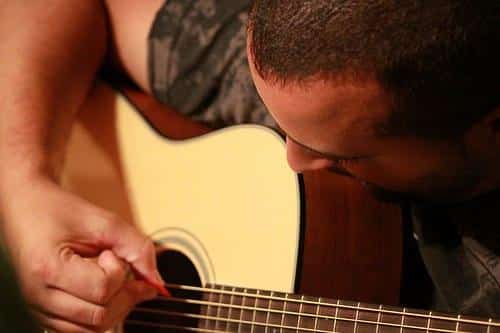
After laying the groundwork of starting as an adult guitar learner, it’s time to shape your journey by setting guitar goals as an adult learner. From my experience, being purposeful about defining goals was the catapult to my own progress in guitar mastery. It kept me focused, motivated, and enabled me to chart clear milestones in my musical journey.
In setting your learning goals, remember the importance of grounding them in realistic, achievable terms. I encourage you to consider your individual aspirations, availability, and current skill level. You might aspire to play complex pieces from your favourite artists, or maybe you want to strum casual tunes to unwind. These aspirations are valid and can be translated into incremental learning steps.
Goals can be as simple as mastering a particular chord in a week or learning the verse of a song in a month. Crucially, setting realistic time frames will foster an environment that encourages and celebrates progress, instead of piling on pressure. As an adult unplugging from a busy schedule, it’s important that your guitar sessions offer a respite, not an added stress source.
Another key aspect of setting guitar goals as an adult learner is flexibility. Acknowledge that there will be days when hitting the mark will be difficult, and that is absolutely okay. The goal isn’t perfection, but continuous, gradual improvement. Understand that progress is not linear. Learning may be slow or swift on various occasions, but every step forward is commendable.
In the same breath, give yourself room for intentional, planned reviews. Evaluating your progress will provide a broader perspective and allow you to adjust your goals, ensuring they still align with your skill level and aspirations.
Goal setting is instrumental because it strongly influences your guitar learning trajectory. It acts not only as a roadmap but also fuels the drive to reach significant milestones in your musical journey. So, set your sights high, but remember, it’s more about the journey than just reaching the destination. As we journey forward into considering the right learning resources, bear in mind the goals we’ve set, and let them guide your selection.
Finding the Right Learning Resources
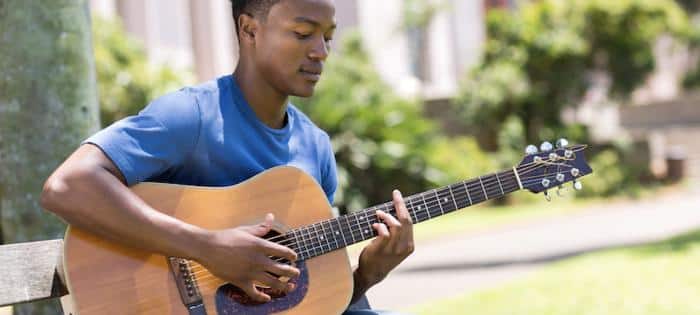
As we delve into ‘Getting Started with Guitar as an Adult’, it’s essential to focus on finding the right learning resources. In my experience, one of the significant advantages of learning guitar in today’s digital age is that quality lessons are just a click away. Acoustic Guitar magazine, where I’ve spent years penning educational articles, and Peghead Nation, a platform I often collaborate with, are great starts. Don’t underestimate the value of well-structured and professionally designed content.
Online guitar courses for adults offer structured, step-by-step lessons that accommodate your pace. These courses are specifically designed with adult learners in mind, considering their time constraints and learning style. More so, they offer comprehensive coverage, starting with the basics and advancing towards complex techniques.
Moreover, providers often supplement these courses with interactive materials and progress tracking tools, further enriching the learning experience. Their advanced analytics can offer you insight into areas you need to focus more on, ensuring a more tailor-fit approach to your learning journey.
For those seeking flexibility, guitar learning apps for adults are a viable choice. These apps provide bite-sized, interactive lessons you can access anytime, anywhere. Plus, they often employ gamified learning strategies, making the process enjoyable and less intimidating.
Both online courses and learning apps provide video demonstrations, notating tools, and a wide selection of music pieces to practice. You’re not simply learning to play guitar; you’re learning to play music, a crucial distinction often overlooked in less professionally curated resources.
Remember, finding the right learning resources is not about choosing the most popular or the most expensive. It’s about finding resources that align with your learning style, preferences, and goals as an adult learner. Once you’ve found your fit, you’re unmistakably a step closer to mastering the guitar.
Making Progress as an Adult Guitar Learner
Maintaining Motivation
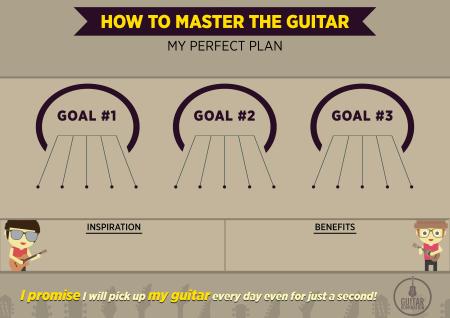
As we delve further into the journey of ‘Making Progress as an Adult Guitar Learner’, motivation often becomes the make-or-break component of true progress. As an experienced guitar player and teacher, I’ve witnessed countless times how maintaining motivation can be a challenge for adult guitar students. But rest assured, it’s an obstacle we all face.
We all embark on this journey driven by immense excitement and determination. As our skills develop, however, the learning curve may dull, and our initial enthusiasm can wane. I, too, have encountered such trying times. It’s crucial at these moments to reignite our passion and find ways to stay motivated.
One approach I’ve always found successful is setting small, realistic goals. These act as stepping stones to the bigger accomplishments, and every achieved goal boosts our confidence, reinvigorating our enthusiasm for the guitar. Furthermore, trying out different genres and playing styles can reintroduce the original thrill of exploration and discovery.
Another invaluable method, often overlooked by solitary musicians, is the act of sharing your music. Play for your friends, join local music communities, or even upload your performances online. An audience can provide an incredible morale and motivation boost. Remember, the ultimate purpose of music is connection and communication.
Maintaining motivation is fundamentally about nurturing our initial love for the guitar and allowing it to steer our journey. It’s the bridge between picking up the instrument as a beginner and mastering it as an accomplished musician. Forge onward bravely with passion, stay motivated and remember how it feels to create beautiful music. The next chapter, ‘Handling Challenges and Obstacles’, will offer you critical insight on how to tackle those inevitable hurdles.
Handling Challenges and Obstacles
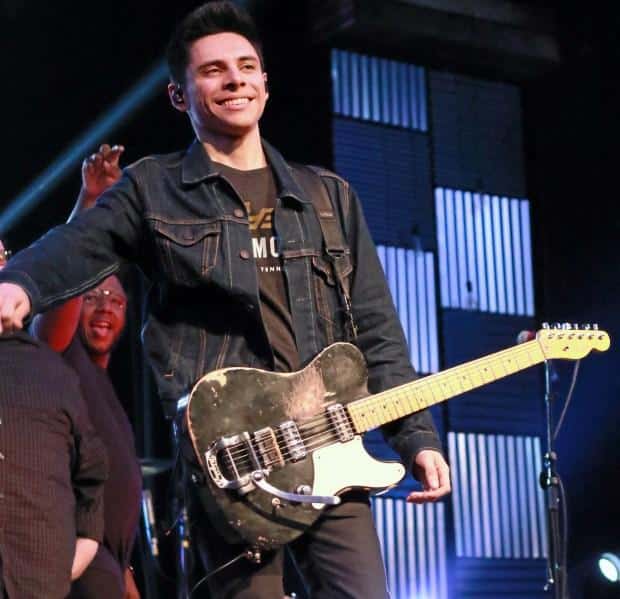
Embarking on my journey, I was soon faced with the distinct ‘challenges in learning guitar as an adult‘. Dexterity, flexibility, and time management became my initial obstacles. However, I found these challenges were opportunities disguised, pushing me to optimize and grow in my musical journey.
Being an adult learner, I realized you can’t rush dexterity. Patience and persistent practice were essential. I started with basic strumming before moving onto complex individual string picking. Incrementally pushing my skills helped me incredibly.
Overcoming guitar learning obstacles associated with flexibility was tougher. Our fingers aren’t naturally inclined to stretch in the manners some guitar chords demand. Daily finger-stretching exercises had a notably positive impact.
A significant obstacle was time management. With work, family, and other commitments vying for attention, it was hard finding consistent time to practice. I realized that dedicated, uninterrupted practice sessions were key, and so I integrated 20-minute focused practice slots into my daily schedule. This helped me maintain steady progress without getting overwhelmed.
In the face of challenges, remember that weaknesses can transform into your strengths if you confront them rightly. To me, these obstacles were a measure of my progress, each challenge overcome marking another step forward on my guitar learning journey.
Despite experiencing the ‘challenges in learning guitar as an adult’, translating them into learning opportunities contributed significantly to my progress. They compelled me to create a personalized learning phase, leading me to ‘Making Progress as an Adult Guitar Learner’ – an essential stage in mastering the guitar. These experiences shaped my progress and may shape yours too, enabling you to successfully overcome any obstacles met along your journey.
Expanding Your Skills as a Mature Guitar Learner
Self-Taught Techniques and Tips
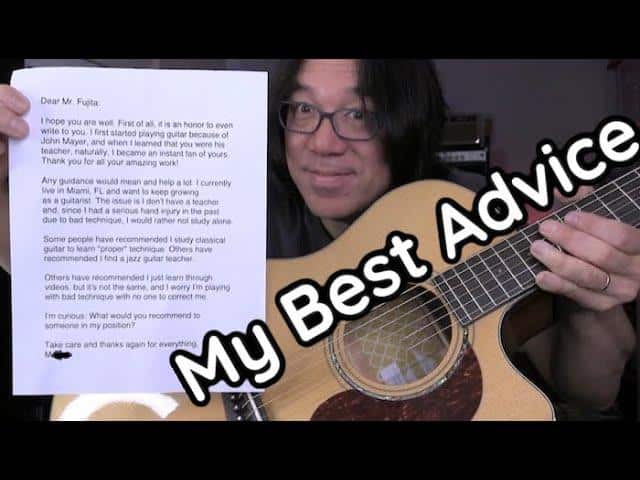
Investing self-guided time in your guitar learning journey can be truly fruitful. Embarking on my own adventures of exploration with the guitar has contributed significantly to shaping my unique playing style. By emphasizing self-taught techniques and utilizing these guitar learning tips, vibrant threads have been woven into the musical tapestry I continue to create.
Being a self-taught guitar player doesn’t mean learning in isolation. Rather, it’s about taking control and shaping your learning according to your specific needs and style. One technique I’ve found extremely useful in my self-taught journey is active learning through improvisation. Spending time jamming with backing tracks or metronomes can open up new dimensions in your awareness and dexterity.
Another practical tip I found invaluable is consistency in practice. Even 15 minutes daily can lead to demonstrable improvements. Attention to detail and capturing the nuances can be the difference between simply playing a piece and invoking the desired emotional response.
Meticulous self-review also plays a crucial role when you’re a self-taught guitar learner. Recording your practice sessions for playback could yield insights from an audience’s perspective, enabling you to pinpoint areas requiring attention.
Lastly, incorporating theory into your practice is essential. Understanding music theory and the guitar’s layout helps lay the foundation for writing your music, improvising with confidence, and enhancing your ability to learn pieces more efficiently.
In conclusion, while pivotal focus is often on acquiring the right resources and teachers as part of guitar learning tips for adults, the role of self-driven exploration should not be underrated. The techniques and tips shared here stem from my personal journey and discoveries, striving to add value to yours. As we progress into the next section, we’ll explore the benefits of joining a guitar player community, which can further enrich your learning experience. Remember, developing mastery in guitar requires an integrated approach that pairs guided help with self-driven learning and discovery.
Joining the Guitar Player Community
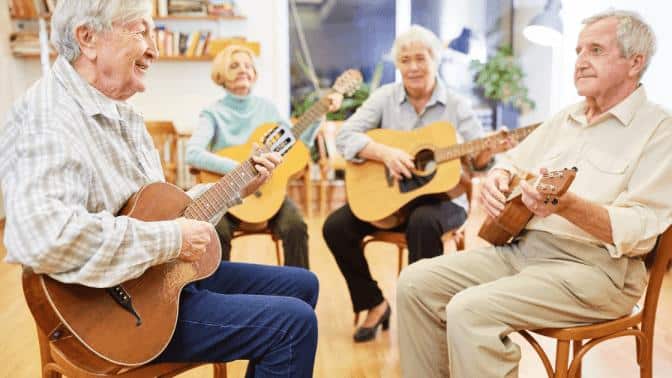
As a mature learner, one of the most powerful ways to continue expanding your skills is joining the adult guitar player community. This step has proven pivotal in my own growth as a guitarist. Engaging in this vibrant community opened doors to a wealth of inspiration, camaraderie and priceless learning opportunities.
Surrounding yourself with like-minded individuals pursuing the same goal introduces a shared sense of purpose. The ability to share successes, challenges, and even failures with those who comprehend your journey foster a closeness and support system that otherwise might be absent in the learning process.
Further, the adult guitar player community is also a hub of knowledge and resources. Here, you can benefit from others’ experiences and learn from their perspectives, expanding your horizons beyond the scope of solo practice. This communal learning contributes significantly to skill development and motivation.
Yet, the relevance of the adult guitar player community goes even beyond the learning aspect. Much like other musical communities, it’s a welcoming space to express yourself, discover new music, and most importantly, make memories. It’s a haven that has the potential to not just amplify your guitar skills, but also enrich your life as a whole.
The adult guitar player community represents a wealth of shared understanding and motivation that can be pivotal for expanding your skills. Because of this, I encourage every mature guitar learner to seek out these vibrant spaces. In doing so, you’re likely to find that your skills, passion, and enjoyment of the guitar will only continue to grow.
Proactively embracing this step towards expanding your skills as a mature guitar player can truly catalyze your progress in mastering the guitar. Let the next chapter of your journey be marked by the growth, camaraderie, and shared love of music found in the adult guitar player community.
FAQs
What age can you start learning guitar in adulthood?
What challenges will I face learning guitar as an adult?
How long does it take to master guitar as an adult?
Conclusion
Throughout our in-depth exploration on adult guitar lessons, we’ve considered various aspects fundamental to your journey. From outlining the benefits of learning the guitar as an adult, helping you establish your learning goals, to offering resources, strategies and tips to solidify your progress. Nothing has been left untouched, whether it’s handling potential challenges, worthwhile strategies for self-teaching, or immersing yourself in the vibrant guitar player community.
So, what’s the endgame of this enriching journey of learning guitar as an adult? Is it the joy that each strum brings, or the sense of accomplishment realized with every tune mastered? Perhaps, it’s the shared connection within a community of like-minded adult learners and guitar enthusiasts. Transitioning from someone who merely admired guitar music to becoming a creator of those bewitching notes, melodies, and chords is an achievement unto itself.
You see, the path to mastering the guitar is invariably filled with a mix of challenges and refinements, joys and frustrations. Yet, the end result, that beautiful melody resonating from your fingers and guitar, is worth every minute invested. It’s worth every strum, every chord, and every note. It’s worth facing obstacles, pushing through despondency, and celebrating minor victories. Because when you feel the music come alive due to your effort and passion, all those challenges fade into insignificance.
So, keep picking it up, even when it feels hard. Keep strumming, even when the chords don’t make sense. Keep playing, even when the melody is off. Keep learning, because the road to mastery is not meant to be smooth but the destination is certainly worth the ride.